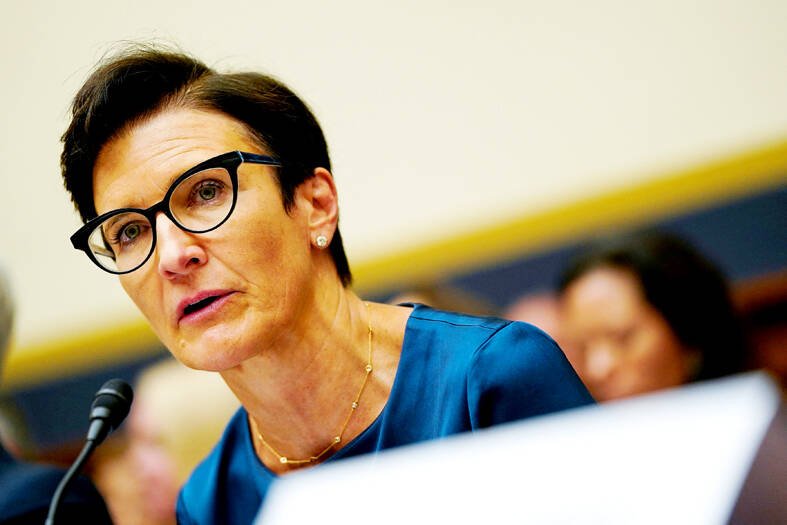Citigroup Inc’s Jane Fraser was forced to answer if her bank would pull business from China if its military invaded Taiwan. Jamie Dimon was pressed on whether JPMorgan Chase & Co would cut ties with Russian firms.
Lawmakers seized on recent political tensions and hot-button social issues in a hearing with the CEOs of the US’ largest retail banks on Wednesday.
Representatives on the US House of Representatives Financial Services Committee probed them on everything from the escalation of the Ukraine conflict and racial equity to fossil-fuel financing and their role in slavery.

Photo: Reuters
“Of course there are concerns, there are disagreements, but that’s how democracy works,” US Representative Maxine Waters, who chairs the committee, said during the six-and-a-half-hour hearing. “We have a lot of work that we must continue as we interact with each other to do the people’s business.”
The breadth of questions served as a reminder of the expansive reach of megabanks, as Waters called them.
They also came as the US economy faces a precarious position, with inflation running at decade-highs, raising the specter of recession. The CEOs were forced to discuss their firms’ approach to helping consumers deal with soaring prices and rising US recession risks.
Dimon, CEO of the biggest US bank, said consumers are in great shape now, but acknowledged there is a chance of a mild recession, which geopolitical events could exacerbate.
Brian Moynihan, Bank of America Corp’s CEO, said consumers have more money in their accounts than ever, but acknowledged that inflation and unemployment are working against them.
The CEOs’ comments came shortly before the Fed raised interest rates by 75 basis points for the third consecutive time on Wednesday afternoon, and forecast they would reach 4.6 percent next year.
The executives faced tough questions about their ambitions in China, with lawmakers asking about reports of human rights abuses there and concerns over its approach to Taiwan.
US Representative Blaine Luetkemeyer asked bank executives if an invasion of the nation would prompt them to withdraw business from China.
Citigroup’s Fraser answered in line with other banks, that she would seek US government guidance before making a move.
However, Luetkemeyer wanted to know what she would do if the government said Citigroup could respond how it wanted.
“It’s a hypothetical question, but it’s highly likely that we would have a materially reduced presence if any at all in the country,” Fraser said.
US Representative Brad Sherman, a Democrat, asked for “yes or no” answers when he pressed banks on their ties with Russian companies. Dimon’s answer — he said the bank is following instructions from the US government — drew a rebuke from the lawmaker.
In another exchange, the CEOs were asked by US Representative Al Green, another Democrat, to raise their hands if a person of color would head their respective banks within a decade. Only one hand went up — Truist Financial Corp chief executive officer Bill Rogers Jr.
The CEOs also danced around related questions about lending decisions to industries like energy producers and gun makers.

The US dollar was trading at NT$29.7 at 10am today on the Taipei Foreign Exchange, as the New Taiwan dollar gained NT$1.364 from the previous close last week. The NT dollar continued to rise today, after surging 3.07 percent on Friday. After opening at NT$30.91, the NT dollar gained more than NT$1 in just 15 minutes, briefly passing the NT$30 mark. Before the US Department of the Treasury's semi-annual currency report came out, expectations that the NT dollar would keep rising were already building. The NT dollar on Friday closed at NT$31.064, up by NT$0.953 — a 3.07 percent single-day gain. Today,

‘SHORT TERM’: The local currency would likely remain strong in the near term, driven by anticipated US trade pressure, capital inflows and expectations of a US Fed rate cut The US dollar is expected to fall below NT$30 in the near term, as traders anticipate increased pressure from Washington for Taiwan to allow the New Taiwan dollar to appreciate, Cathay United Bank (國泰世華銀行) chief economist Lin Chi-chao (林啟超) said. Following a sharp drop in the greenback against the NT dollar on Friday, Lin told the Central News Agency that the local currency is likely to remain strong in the short term, driven in part by market psychology surrounding anticipated US policy pressure. On Friday, the US dollar fell NT$0.953, or 3.07 percent, closing at NT$31.064 — its lowest level since Jan.

The New Taiwan dollar and Taiwanese stocks surged on signs that trade tensions between the world’s top two economies might start easing and as US tech earnings boosted the outlook of the nation’s semiconductor exports. The NT dollar strengthened as much as 3.8 percent versus the US dollar to 30.815, the biggest intraday gain since January 2011, closing at NT$31.064. The benchmark TAIEX jumped 2.73 percent to outperform the region’s equity gauges. Outlook for global trade improved after China said it is assessing possible trade talks with the US, providing a boost for the nation’s currency and shares. As the NT dollar

The Financial Supervisory Commission (FSC) yesterday met with some of the nation’s largest insurance companies as a skyrocketing New Taiwan dollar piles pressure on their hundreds of billions of dollars in US bond investments. The commission has asked some life insurance firms, among the biggest Asian holders of US debt, to discuss how the rapidly strengthening NT dollar has impacted their operations, people familiar with the matter said. The meeting took place as the NT dollar jumped as much as 5 percent yesterday, its biggest intraday gain in more than three decades. The local currency surged as exporters rushed to